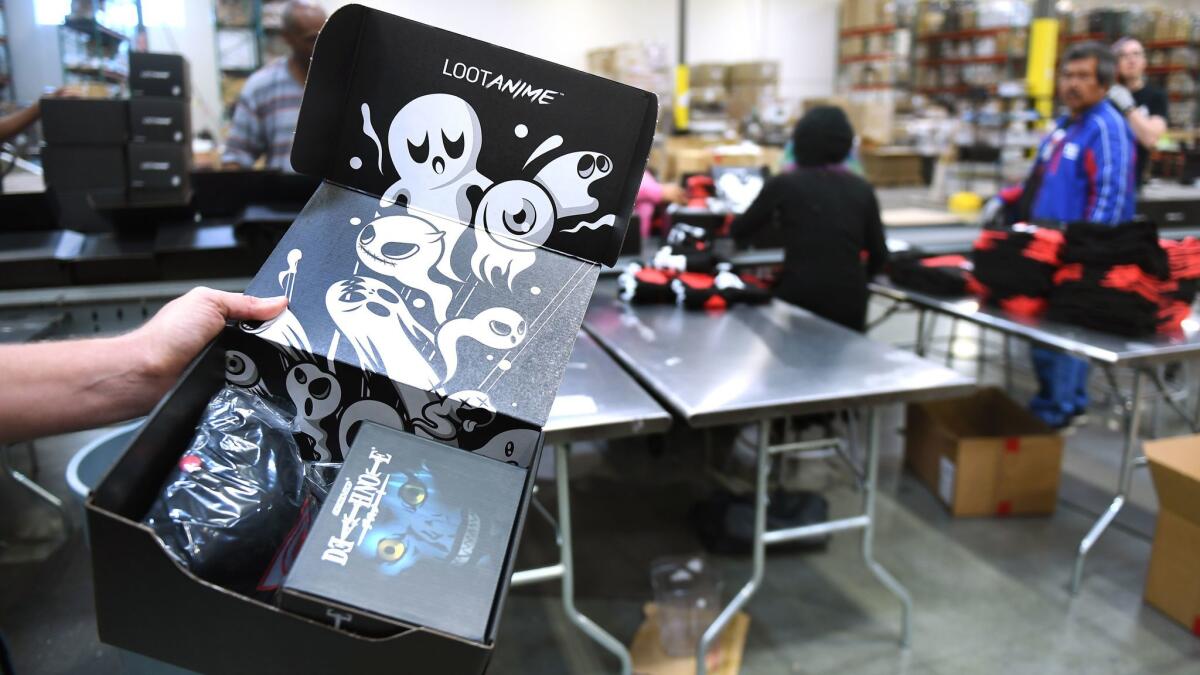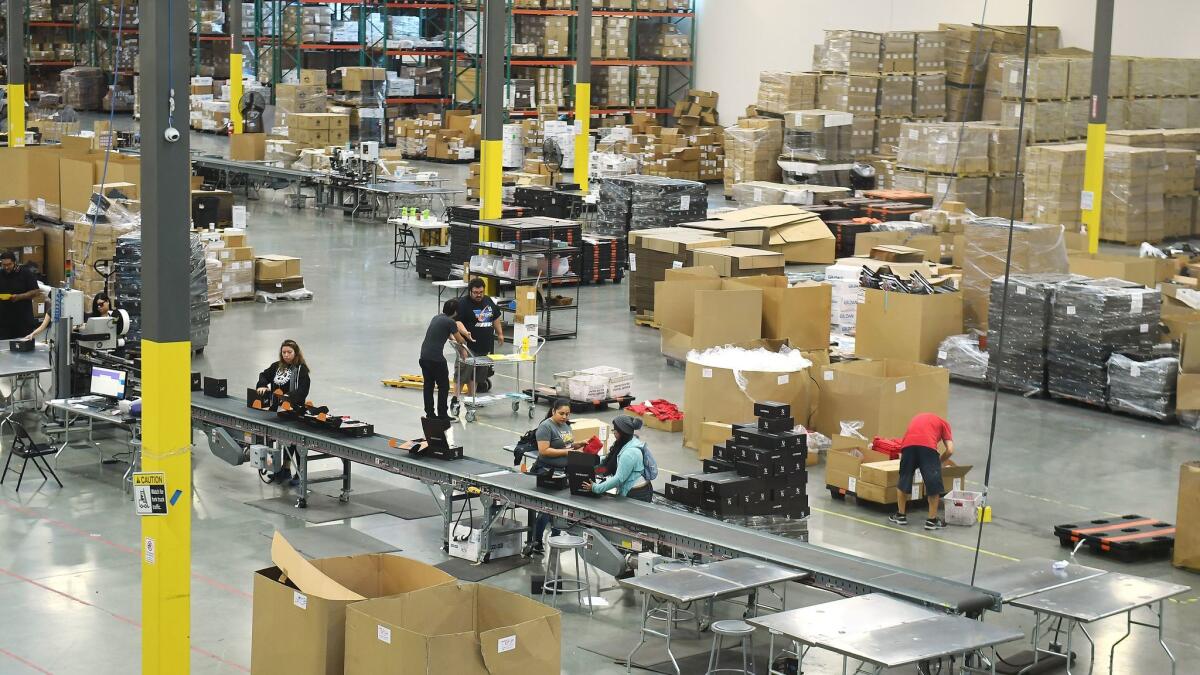Loot Crate became the nation’s fastest-growing start-up, then it laid off over a quarter of its staff

The company drew accolades for its fast growth, but tensions simmered inside the operation.
On its ascent to becoming the nation’s fastest-growing start-up, Loot Crate Inc. fostered a workplace in which employees warred with Nerf guns, proudly brandished Captain America socks and chanted the company’s name like a rally cry.
But by last summer, when the Los Angeles firm landed on the cover of Inc. magazine for its stupendous expansion, the enthusiasm had been zapped.
Employees gossiped about layoffs, frustration over managers and a dwindling snack bar inside a cramped, windowless warehouse of an office. Last month, two senior executives came an eyelash away from fighting, not with foam darts, but with fists.
Chief Executive Chris Davis now says he may have done the unimaginable: grown the company too fast.
“We bit off a lot and everyone felt that," Davis said during an interview at the company’s Bell merchandise facility. “Trying to get all these different perspectives, skill sets and levels of experience to work together was probably harder than I expected it to be.”
Loot Crate key stats
- 2012: year founded
- 27: subscription box options
- 650,000: subscribers
- 16 million: boxes shipped
- 243: employees
- 4: years before raising venture capital
- $165 million: 2016 revenue
Source: Loot Crate
Between 2012 and 2014, Loot Crate amassed 200,000 subscribers to its $20 monthly shipments of apparel and collectibles related to video games, comics and pop culture (think Birchbox for the Comic-Con set). It then launched packages aimed at pet owners, Harry Potter readers, wrestling fans and more. Subscriptions increased to 650,000, pushing sales to $165 million in 2016, up almost 40% compared with the previous year. Over 18 months, the staff nearly doubled to 280.
Davis proceeded despite repeated warnings from subordinates and investors that adding so many new varieties of boxes was financially unsound — more subscribers didn’t mean better profit margins.
In February, with investors bearing down, Davis laid off 60 workers and announced a narrowed focus that favors squeezing out profit over adding subscribers. During the course of the winter, the company cut about 27% of its workforce and lost its chief financial officer, senior vice presidents of technology and brand management, vice president of procurement and directors of product and growth.
Accounts by 17 current and former employees and others close to Loot Crate provide an inside look at how start-ups can be swept into a grow-fast mentality that pervades companies funded by venture capital, even when such a strategy may not be suitable. Prioritizing growth can be a boon to software firms that can add customers to existing services with minimal extra cost. But in dealing with hard goods, international logistics and a demanding fan base, Loot Crate shows the consequences of extending the tactics of the app economy to retail.
Loot Crate has breezed through $18.5 million in venture capital raised a year ago. And it’s beset with more than $20 million in excess inventory that’s difficult to pawn off. The financial hole, along with a soured culture, has left doubts among past and current staffers whether Davis can lead a rebound.

The company had a fairy tale start. After bouncing around start-ups during his first few years out of Claremont McKenna College, Davis pitched the idea for a geeky subscription box during a business contest in 2012. Overnight, he and eight strangers launched the Loot Crate website and attracted dozens of customers.
Davis — the son of Qualcomm Inc. Chief Financial Officer George Davis — had participated in such hackathon projects before, including a dating app for movie fans called Box Office Buddies. But Loot Crate soared unlike any other, tapping into long unmet demand for gear that people couldn’t get at most malls.
Far more people expressed a passion for Spider-Man lunch pails and “Doctor Who” T-shirts than for centerpieces of Davis’ two prior ventures — custom-fit clothing and trail mixes marketed toward video game enthusiasts. He figured Loot Crate’s growth would be unstoppable if it cracked into other interests, say sports fans or film buffs.
Most of Loot Crate’s initial creators didn’t stay, but Davis and Matthew Arevalo stuck around as co-founders. The company sustained on its own cash for four years, despite thin profit margins, because it had so many subscribers. Issues, like the website crashing because of a blitz of new customers, were good ones.
The mood sank in early 2016.
Loot Crate held its first layoffs, axing 12. Remaining employees felt insecure as Davis installed superiors from large companies in the region, including toy maker
“You didn’t know everyone like you used to know everyone,” Davis now says. “We could have done a lot better job of helping explain our culture to people coming on board, helping share it across teams and helping it evolve.… You can’t come back and fix that.”
Employees said they could have looked beyond the issues had they not been magnified by the pace of hiring and the mounting challenges of selling novelties.
In mid-2015, Loot Crate added a box for sweatshirts, socks and other clothing too pricey for its main box. Soon came Loot Anime, Loot Gaming and the high-end Loot Crate DX with messenger bags and mugs. Partnerships brought special edition crates for the video game “Halo” and World Wrestling Entertainment.
New options stunted the original crate’s growth, breeding disillusionment internally as Davis touted progress publicly. As time wore on, they saw awards and banquets on one hand, layoffs and co-workers downing early-morning whiskey in the office on the other.
To Davis, niche options for boxes thwarted cancellations because people received items closer to their passions. He said colleagues and surveys of tens of thousands of customers backed new crates.
“We all were working on things and really saw the opportunities,” he said.

Some products including Loot Gaming grew more profitable than the original line, while Loot Pets sat among disappointing financial performers. Davis said he’s pleased with Loot Pets because it satisfies subscribers.
The two-year leap from one product to 27 came with other pains. Loot Crate angered Disney, HBO and Netflix when it used unauthorized images to market crates featuring items from “Star Wars,” “Game of Thrones” and “Daredevil,” according to three former employees. The company also frustrated vendors with late payments and last-second order changes.
HBO said the door is open for partnerships. Other firms, including suppliers Bioworld Merchandising and Quantum Mechanix, didn’t respond to requests to comment. Davis declined to comment on specific licensing issues, but said the company has rights to 200 properties.
New employees kept arriving as recruiters talked up big funding on the horizon. Last June, Loot Crate announced an $18.5-million check funded by Los Angeles’ biggest start-up investor, Upfront Ventures, and investment vehicles tied to magazine publisher Time Inc., actor
At the time, Upfront Ventures praised the discipline Loot Crate must have to succeed without venture capital. But angst among staffers rose as they saw focus wane.
Employees went home earlier and casual conversation on the company’s internal chat app Slack declined. Snack shelves weren’t stocked as often, or perhaps with all the new hires the food just ran out sooner. Bathrooms grew dirty. Bonuses arrived as stock, not cash. Negative reviews on jobs site Glassdoor piled up. A promised new office to replace the company’s Lincoln Heights space remains indefinitely delayed. Adding bodies was treated as a solution to deep problems, current and former employees say.
Early this year, Davis introduced leadership training programs for employees. He instituted quarterly goal setting and performance reviews. But it was too late for many: At least one employee received a single 90-minute weeknight career coaching session before being laid off.
The night before a teary Davis internally announced the massive layoff of 60 people, Chief Financial Officer Eric Chan resigned.
Chan had criticized widening losses. At an offsite meeting as Davis honeymooned last year, Chan rallied executives on urgent cost cutting that he hoped Davis wouldn’t railroad, according to attendees. Chan declined to comment.
“He was putting the fear of God in everyone,” an attendee said. “And Davis returned and said, ‘Nah it’s all good.’ ”
Davis saw the company’s business model validated with Unilever’s $1-billion acquisition last summer of Dollar Shave Club, a Los Angeles razor brand that had amassed 3.2 million subscribers.
Whether the public sees a future in subscription-box companies, at least for essentials, is being tested with meal kit maker Blue Apron’s initial public offering of stock this week. Many services focused on nonessential items haven’t demonstrated longevity.
Davis changed his stance on cost cutting as Loot Crate set its 2017 budget last fall, though he delayed major layoffs longer than investors preferred, with a trickle of about 15 people let go at the new year.
But amendments are taking hold. Loot Crate’s last quarter was profitable. And recently, the start-up named veteran media executive Ynon Kreiz chairman of its board of directors.
Kreiz, the former Maker Studios and Fox Europe chief who reportedly invested less than $1 million as he joined the board, declined to comment, as did other investors and board members.
Mark Suster, managing partner of Upfront Ventures, said Loot Crate suffered “self-inflicted bumps in the road,” but that “the wheels weren’t falling off” because Davis has begun making more responsible decisions.
Davis scrapped a team developing games for virtual and augmented reality devices because the fruits of their labor would be too far off. Also gone is Davis’ close friend, a manager whom multiple sources said attracted concern for dating co-workers and making brash business decisions.
Still, heightened tensions haven’t dissipated, sources said.
Scores of employees in May overheard senior leaders David Morris, a longtime automotive parts executive, and David Voss, a former Mattel executive, yelling about how one shouldn’t be telling the other what to do. Voss shoved Morris before the altercation broke up.
Davis declined to comment on specific personnel matters. But in an email the day after the May 2 incident, he included apologies from the pair for “uncharacteristic” and “poor” behavior. The note ended up raising more concerns as employees shook their heads at spelling errors and wondered why the dispute didn’t result in immediate firing.

The company’s desire to get into additional sports poses ongoing challenges. Loot Crate estimated it had 50,000 subscribers for the first month of its new Major League Baseball crates. Two former employees said the company drew about 20,000 subscribers, meaning thousands of extra bobbleheads and T-shirts sit unsold.
MLB declined to comment. Davis disputed the figures.
“It’s really hard to predict,” he said of forecasting sign-ups. “We actually did a good job on many product lines. We feel everything we've launched is successful.”
Forecasting is crucial since Loot Crate orders merchandise months ahead. But former employees recalled little analysis. When staffers lowered expectations for subscriber growth, Davis, they said, still insisted on big orders. As workers saw it, Davis would rather absorb extras than sell out. They also worried about not having a plan to decide when to end a struggling crate.
Unsold merchandise, such as 100,000 Han Solo figurines, totals $20 million, three people said. A 120,000-square-foot warehouse in Bell filled up so fast the company added 50,000 square feet of space nearby for excess. Nearly $1 million in inventory went missing last year, a former employee said. The current and former employees sought anonymity because of nondisclosure agreements. Loot Crate disputed the figures they provided, but declined to release its data.
Loot Crate board of directors
- Ynon Kreiz, former chairman and CEO at Maker Studios, Endemol and Fox Kids Europe
- Greg Bettinelli, Upfront Ventures
- Terry Boyle, president NordstromRack.com, HauteLook and Trunk Club
- Chris Davis, chief executive
- Ryan Hibbard, vice president of finance and strategy
Loot Crate can’t discount products through T.J. Maxx or Big Lots as easily as traditional brands because subscribers pay a premium for their exclusivity. Instead, the company tries to liquidate goods through its own online shop (competing with EBay listings) and remains in discussions with retailers about potential partnerships.
The company recently leased 200,000 square feet in a former aircraft assembly plant in Lock Haven, Pa. Workers viewed the East Coast facility as long overdue because it should lower expenses. But a bungled move generated customer complaints about missing or late orders.
Other outstanding matters include two lawsuits. In February, Loot Crate sued the maker of 440,000 oven mitts that had to be recalled last May after allegedly being unable to withstand heat. In the other case, a supplier of shirts last spring alleges $149,000 in unpaid bills. Loot Crate countersued, alleging shirts were blemished.
In an email to employees before The Times’ interview with Davis, Loot Crate's corporate communications head Erik Reynolds told employees that stories of internal struggle are "a rite of passage for successful companies" and that start-ups always hit a transition from "way it was" to the "way it will be."
Twitter: @peard33
ALSO
Imax lays off 100 employees to cut costs as box office slows
David Lazarus: Chiropractic treatment, a $15-billion industry, has its roots in a ghost story
Why this UCLA professor thinks she inspired the video game 'Halo'
Santa Monica couple fights Snapchat over 'geofilter' trademark




